Coronavirus and its effects on the economy have shown that there are many employees who are critical thinkers, proactive, and strong-willed persons. They are self-starters who can write their own stories about their careers.
However, there are many others who are still not being able to get a suitable job.
Why?
There are several significant reasons and common CV mistakes are one of them.
As a job seeker, you've to think of your resume as an ad targeted towards your future boss.
If this advertisement has many grammatical errors, has formatting mistakes, doesn't have a professional format, do you think you'll get the job?
I've compiled a list of about 30 Most Common Mistakes in CVs that may lead to not getting invited for the interviews or not getting the job.
Using One CV To All Jobs

So, tailoring your CV to the recruiter's requirements will secure you the job, and it will show how you exert an effort accomplishing your tasks (which is job search).
You can use a generic CV in two cases only: Uploading your CV to an online job portal or attending a job fair where you don't know exactly the job descriptions. You have to study the market and define some keywords that are usually used in your industry.
Using Unprofessional Email Address
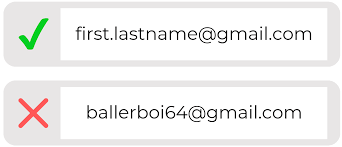
It seems unprofessional, and the recruiter will doubt your seriousness and overall attitude to work as a result.
Create a new formal email address to leave a good impression while using it in your resume.
Ignoring The Robot Recruiter (ATS)

Keywords are not the only thing that impresses the system. So, what should you do?
Make sure your CV is well-formatted, well-organized, and easy to read. Separate parts of the CV with headings, and stop using photos, maps, or graphs. (These make it difficult for ATS to scan your CV, which can result in it being placed in the rejection box.)
Read here a complete guide about the ATS.
Big Messy Paragraphs
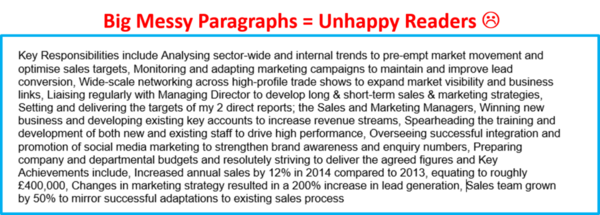
Ignoring Writing a Strong Summary
When creating your resume, stop diving right into your job responsibilities without giving a solid summary first. It will make it difficult for recruiters to consider how your job affects the company and how you'll be the perfect fit for the new company culture.Begin each role with a concise description of what you did and how your work leads to the company's overall success.
Using Logos and Icons
In a CV, logos and icons aren't necessary; they're always poorly organized and take up a lot of space in the resume. Words can better express the valueToo many images will also increase the file size of your CV and cause it to be misread by CV scanning tools, resulting in distribution delays or loss to specific inboxes.
Use just text in your CV to keep it easy.
Using Skill Graphs
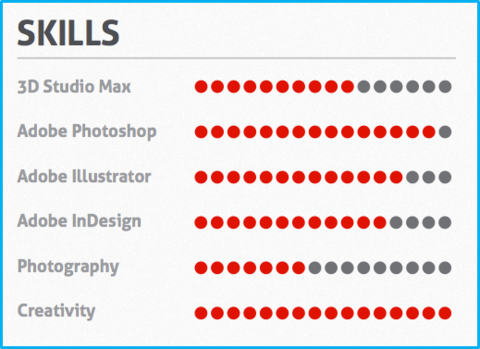
The easiest way to provide concrete proof of your abilities is to do so in text format. For example, rather than give yourself a 9/10 in Microsoft 365, say that you're Microsoft Certified (if this real). Similarly, rather than rating your team management abilities, describe how you led a team of 10 sales assistants to go above and beyond sales goals by 50% regularly.
Using Many Colors

Stick to safe colors and use them in headings only.
Don't go crazy by changing the backdrop color or writing the whole CV in a vivid neon color.
Focusing On Responsibilities Rather Than Achievements
Before posting a job ad, every recruiter knows what this employee will do. So, no need to mention your full responsibilities in your current role.Instead, show off your unique talents and abilities on your resume and highlight how they affect an employer.
Don't merely state your duties; move on to clarify the results you've achieved and the value you've added.
Don't just write, for example.
"Preparing tax records and auditing expenditures."
Extend to illustrate your value.
"By producing accounting accounts and reviewing expenses, we were able to save AED 10k a year."
You will not be able to do this with all of your duties, but strive to do it where you can.
Using Clichés

Give answers to "How proactive, were you? When did you come up with new ideas? Rather than focusing on clichés, career applicants should show their accomplishments."
Misuse of Fonts
One of the essential characteristics of a successful CV is that it should be easy to read for recruiters and employers.Although it can be enticing to use a glamorous font to provide a special touch to your CV, it would make it difficult to read and cause recruiters to skip your cv.
Have a look at the following scenarios.
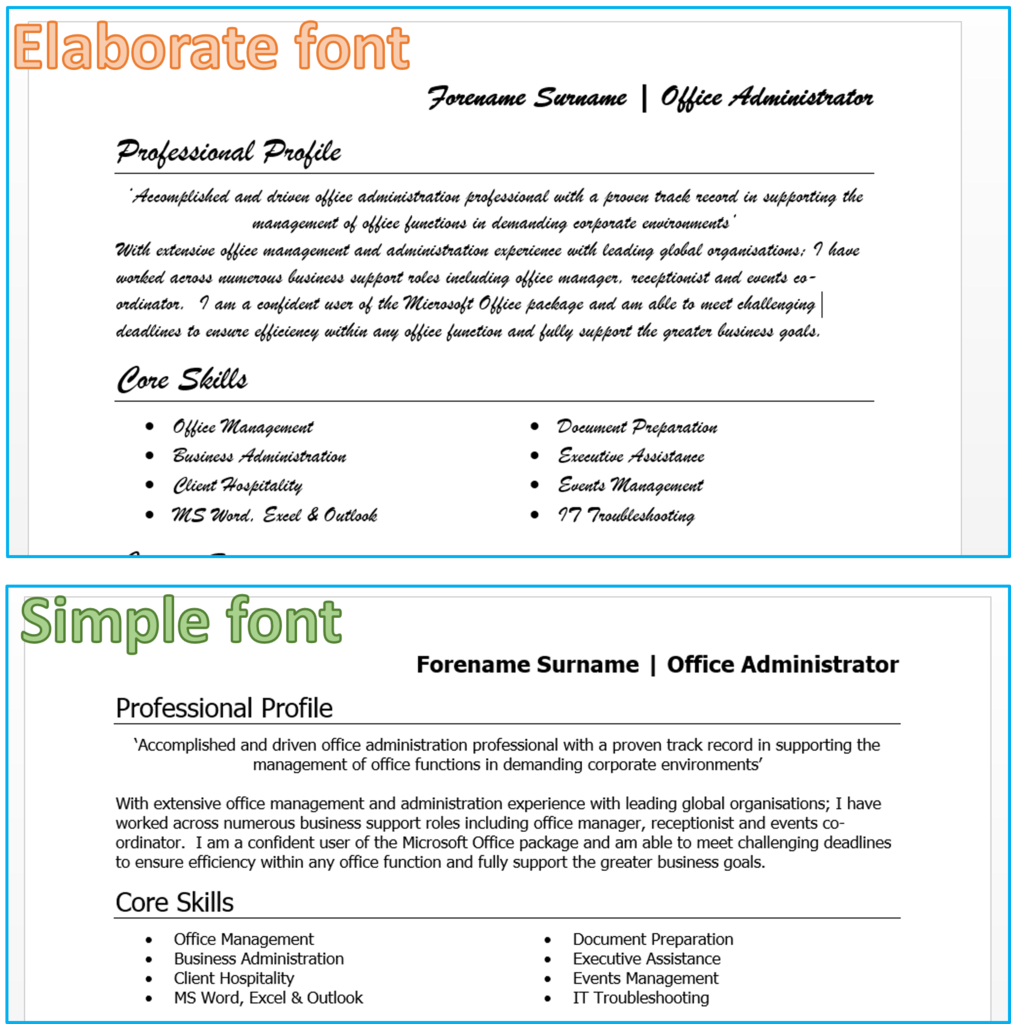
Use neat but simple fonts like Ariel or Tahoma.
Moreover, you have to stick to using one font in your cv to avoid having a messy one. You can also use two fonts, one for headings and one for the body but make sure that they give the end's neat look.
Mentioning Reasons for Quitting Your Job
Recruiters do not need to know why you quit each job on your CV. Your resume's prime purpose should be promoting your skills. It's your "advertisement." If the recruiter wants to know why you have left your previous job, he will ask you directly during the interview.
Mentioning Salary Details

You can talk about money when you're talking only about how you enhanced business revenue or how you executed a good strategy on time and budget, for example. Leave anything else to the point of the interview or negotiation.
Heavily Repeating Words

Recruiters try to know about your communication skills and creativity levels through your cv, so repeating the same word many times may cost you the job.
Read your CV loud and find if you say the same word many times. You can overcome this by finding synonyms for your word. Google the word "Manager, for example" and search for its synonyms to show how your language is vital too.
Transitions between pages on the CV are a mess
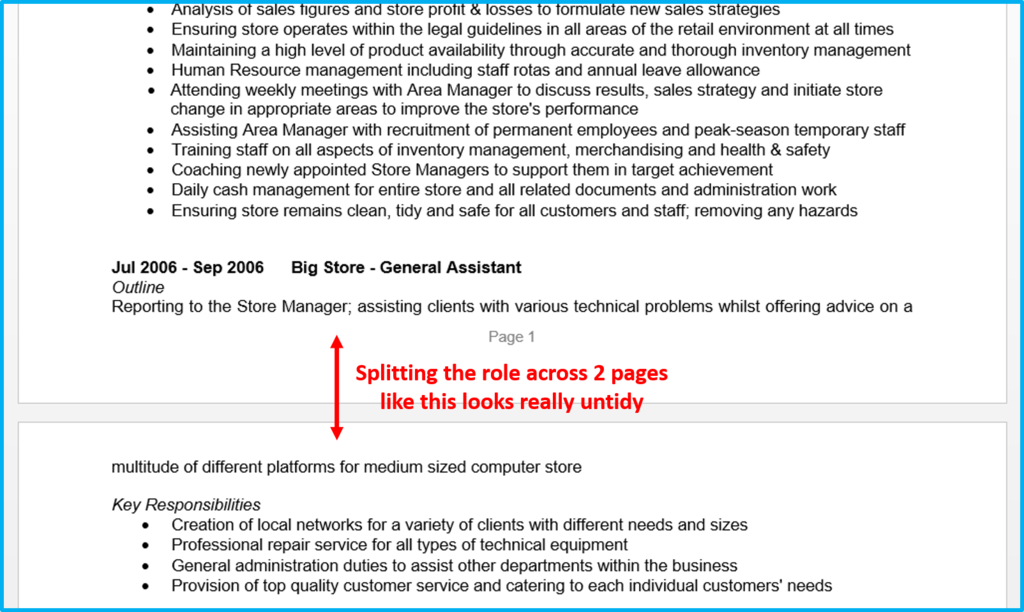
That is a significant issue, but it can be resolved by changing the page borders or shifting a paragraph to the next page.
Too Many Pages
A busy recruiter will not read a five-page CV because they have to review hundreds if not thousands of resumes.To guarantee that you share the relevant facts effectively and make a high-impact CV, keep your CV to two pages or less. Make your points concise and to the end.
Ordering Work Experience Wrong
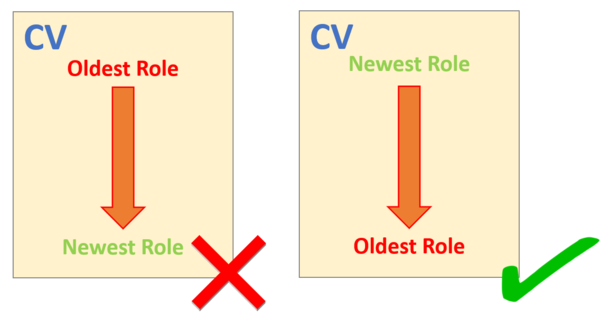
Recruiters are interested in discovering more about your last position and how your skills will help their companies excel. So, pay attention to your previous role and don't mention too many details in your past roles to save the recruiter's time and your cv's space.
Skipping Employment Gaps
Contrary to common opinion, employment gaps would not delay your application if you are open about them. However, lying about or ignoring them will damage the odds of securing a job.Remember! Having convincing reasons may land you the job in some cases when the employer feels you're serious about accomplishing other things like obtaining a certificate, taking care of a sick person, etc.
Sending A PDF CV
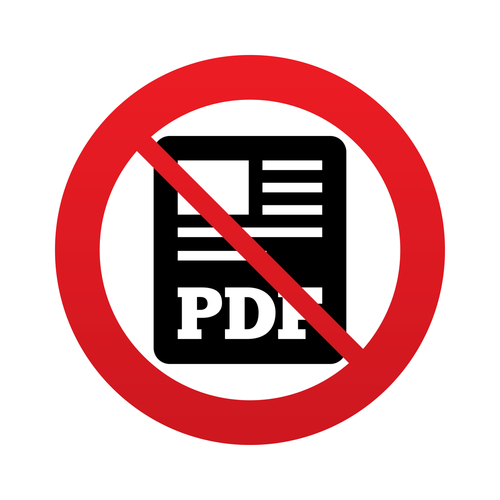
You may experience a frustrating online job application process, and to escape it, you have to type your resume in an online text box. How you'll order all your resume details if it's a PDF? Having a word document will make it easy to copy/paste the content and end this ongoing process.
Employers may also like the resume to have a word document type. If the job ad explicitly demands a version of your CV for a text or word document, do not submit a PDF version.
Adding Reference Section
Another CV major mistake is devoting a whole segment to references. It's just an out-of-date method that wastes space that might otherwise be used to showcase your achievements.Also, don't write "references available upon request." The recruiter knows – or at least assumes – that you have credentials, and they can ask for a list when they need it.
Grammatical and Spelling Mistakes
How would be your impression when you find an applicant who writes his name missing a letter? Will you continue reading his resume?Suitable applicants are expected to have excellent writing skills, but grammatical or spelling errors will jeopardize the reputation.
If you want to be extra confident, proofread your CV for grammatical errors and use a grammar testing app like Grammarly.
Ignoring Social Media Accounts

Creating a LinkedIn profile is a brilliant place to start, as it has become an essential aspect of 21st-century recruiting. If you do have one, make sure to keep it updated with new accomplishments, qualifications, and articles daily. If necessary, you can connect to your Facebook, Twitter, and even YouTube and Instagram accounts.
Using A Generic File Name
Instead of saving your CV as cv.txt, spend some time crafting a professional name. Your cv file name should be your name+ your title. This shows your professionalism and commitment.
Other major mistakes in CVs are:
- Using unprofessional Photo
- Listing wrong contact details
- Including personal information
- Switching between tenses & using many personal pronouns
- Not using action verbs
- Writing in the third person
- Using an objective statement
Conclusion
When writing your CV, there are many pitfalls to make that may hurt your career trajectory.So, pay attention to these mistakes, and you'll see the difference while getting more interview invitations.
If you need more help in writing your CV, you can:
Read here for a comprehensive guide on writing resumes.
And
Register on Drjobpro.com, Filling out your profile sections, and download your automatically created CV.








 2023-03-22
2023-03-22
 2022-10-11
2022-10-11
 2022-09-25
2022-09-25
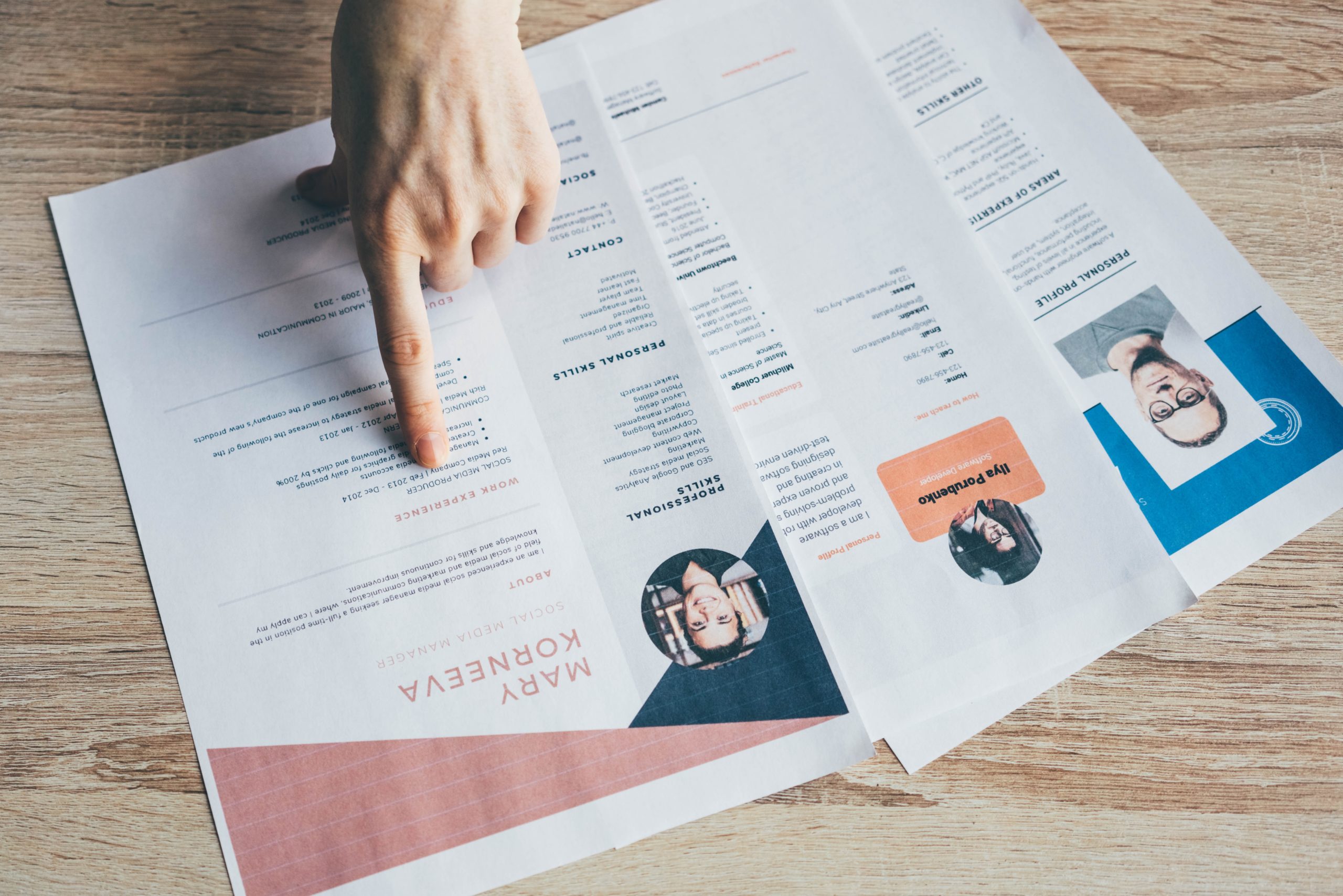 2022-09-14
2022-09-14
 2022-09-11
2022-09-11